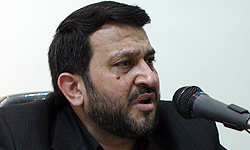IRGC Deputy Commander: Iran Standing at Peak of Military, Scientific Power

 Deputy Commander of the Islamic Revolution Guards Corps (IRGC) Hamid Reza Moqaddamfar downplayed the recent war rhetoric by the enemies against Tehran, and underlined that Iran is now standing at the heights of military and scientific power.
Deputy Commander of the Islamic Revolution Guards Corps (IRGC) Hamid Reza Moqaddamfar downplayed the recent war rhetoric by the enemies against Tehran, and underlined that Iran is now standing at the heights of military and scientific power.
“The Islamic Iran unlike its enemies holds military and scientific power in the region and has made great progress in military, scientific, economic and different industrial fields as well as human resources,” Moqaddamfar said on Sunday.
“Today we are at the heights of might and power and the soft power of the Islamic Republic has inspired the Islamic Awakening in the regional countries,” he added.
zionist israel and its close ally the United States have repeatedly warned of a military strike on Iran.
Both Washington and Tel Aviv possess advanced weapons of mass destruction, including nuclear warheads, but they accuse Iran of seeking a nuclear weapon, while they have never presented any corroborative document to substantiate their allegations.
Iran vehemently denies the charges, insisting that its nuclear program is for peaceful purposes only.
Speculation that Israel could bomb Iran mounted since a big Israeli air drill three years ago. In the first week of June, 2008, 100 Israeli F-16 and F-15 fighters reportedly took part in an exercise over the eastern Mediterranean and Greece, which was interpreted as a dress rehearsal for a possible attack on Iran’s nuclear installations.
Iran has, in return, warned that it would target israel and the US as well as their worldwide interests in case it comes under attack by either country.
Iran has also warned it could close the strategic Strait of Hormoz if it became the target of a military attack over its nuclear program.
Strait of Hormoz, the entrance to the strategic Persian Gulf waterway, is a major oil shipping route.
Meantime, a study by the Institute for Science and International Security (ISIS), a prestigious American think tank, has found that a military strike on Iran’s nuclear facilities “is unlikely” to delay the country’s civilian program.
The ISIS study also cautioned that an attack against Iran would backfire by compelling the country to acquire nuclear weaponry.
Also a study by a fellow at Harvard’s Olin Institute for Strategic Studies, Caitlin Talmadge, warned that Iran could use mines as well as missiles to block the strait, and that “it could take many weeks, even months, to restore the full flow of commerce, and more time still for the oil markets to be convinced that stability had returned.”







